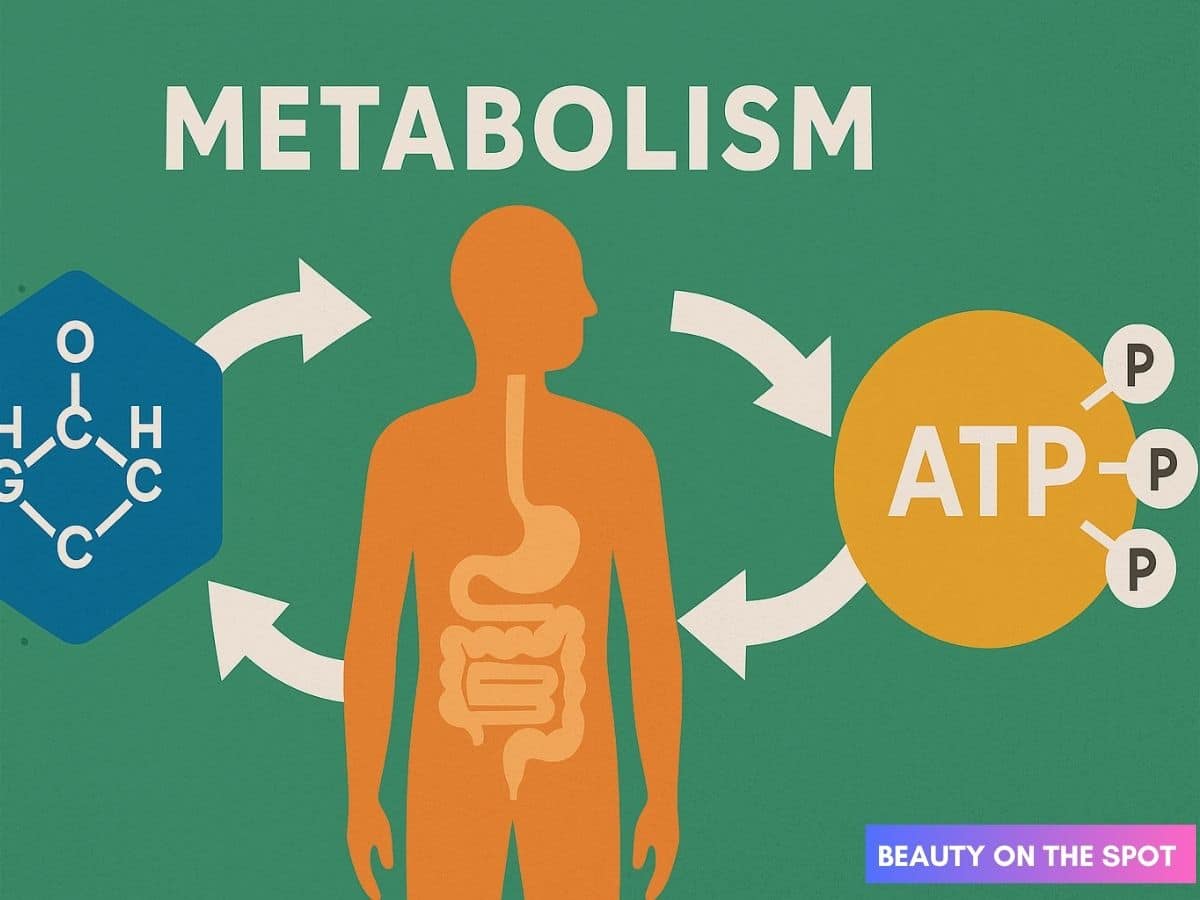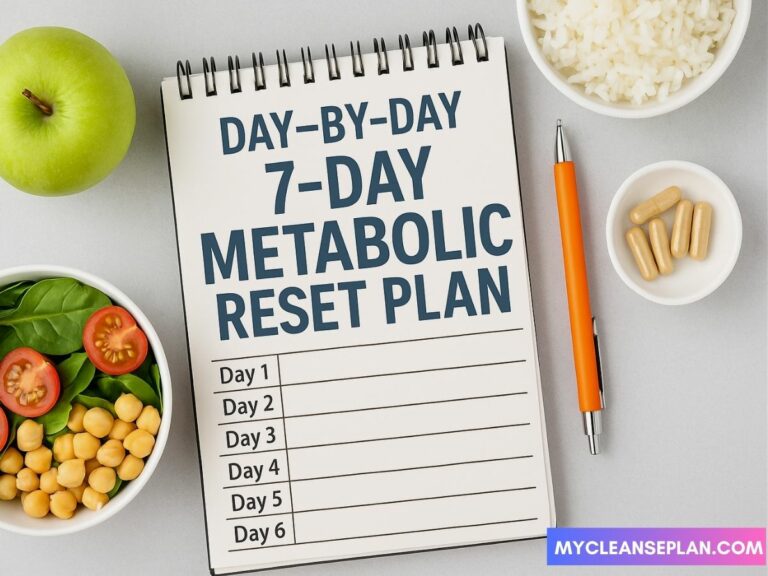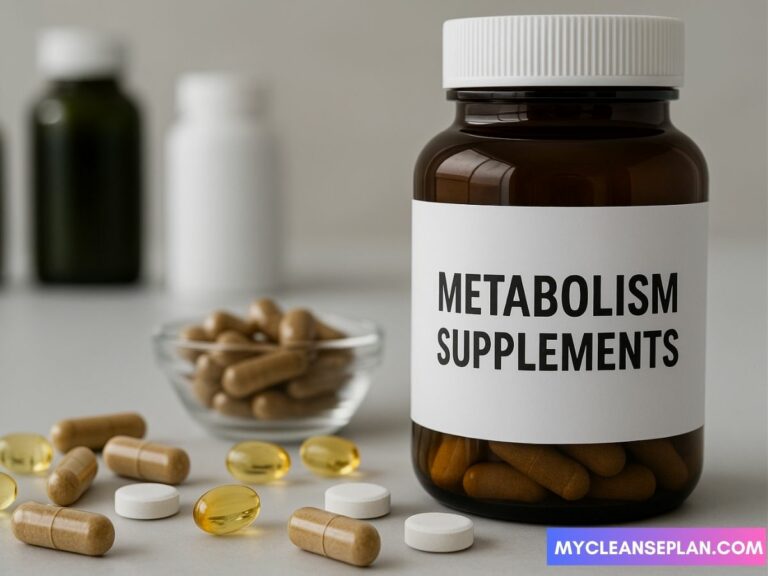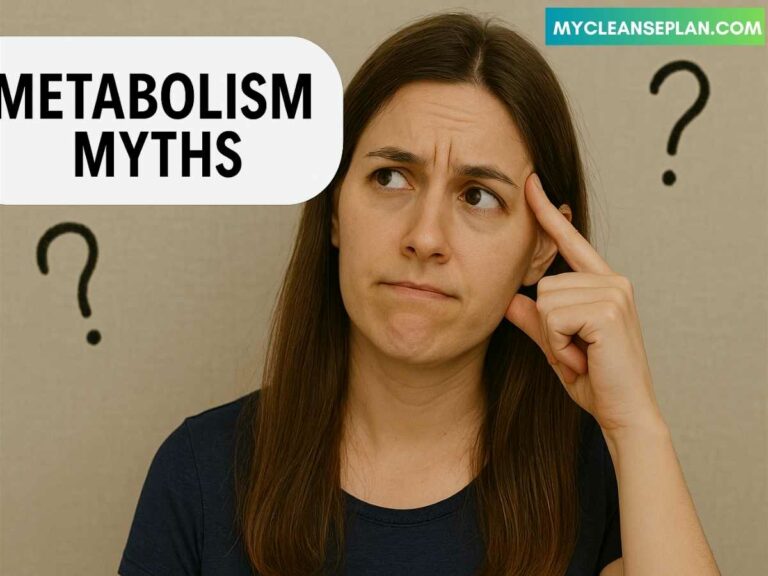Signs Your Metabolism Is Slowing Down
Signs of a slowing metabolism include unexplained weight gain, fatigue, difficulty losing weight, cold sensitivity, and digestive issues. These changes often occur with age, hormonal shifts, or a sedentary lifestyle. Identifying the symptoms early can help you take steps to restore your metabolic balance.
As we get older, our metabolic rate naturally goes down. This can lead to symptoms that affect our health.
Did you know that a big drop in metabolism can start as early as our mid-30s? This can cause weight gain, fatigue, and other issues that change our daily lives.
It’s important to know the signs of a slowing metabolic rate. This helps us take steps to keep our metabolism healthy.
In this article, I’ll talk about the main signs of a slow metabolic rate. I’ll also share tips on how to speed it up.

Key Takeaways
Understanding Metabolism: What It Is and How It Works

To understand a slowing metabolism, we need to know the basics. Metabolism is how our bodies turn food into energy. It’s shaped by age, genetics, and lifestyle.
The Science Behind Metabolic Rate
Our metabolic rate shows how many calories our body needs to work. It’s based on our Basal Metabolic Rate (BMR) and Total Daily Energy Expenditure (TDEE). BMR is the calories we need when we’re resting, and TDEE includes our daily activity.

The gap between BMR and TDEE is key. It shows how much energy we use each day. Here’s a table to help understand this:
| Category | Description | Caloric Needs |
|---|---|---|
| BMR | Calories needed at rest | 1,200-1,600 calories |
| TDEE | Calories needed with daily activity | 1,800-2,400 calories |
Basal Metabolic Rate vs. Total Daily Energy Expenditure
Knowing the difference between BMR and TDEE is key. BMR is our caloric base, while TDEE shows our daily energy use.
Factors That Naturally Affect Your Metabolism
As we get older, our metabolism slows down. Genetics, lifestyle, and health issues also play a role. Keeping a healthy lifestyle, like eating right and exercising, helps our metabolism.
Understanding metabolism and its factors helps us spot and fix a slow metabolism.
Weight Gain Despite No Changes in Diet

Seeing the scale go up without changing what you eat can be confusing. This often points to a slower metabolism. It’s a common problem that can be frustrating.
Why Unexplained Weight Gain Happens
Several factors can lead to unexplained weight gain due to a slower metabolism. When our metabolism slows, we burn fewer calories. This results in weight gain. Key reasons include:
- A decrease in muscle mass, which is a significant factor in metabolic rate.
- Hormonal changes that affect how our body processes fat.
- A reduction in physical activity, which can further slow down metabolism.
The Shift in Fat Distribution
As we age, our body changes, including how fat is distributed. Fat often builds up around the midsection, more so in those with a slower metabolism. This is due to:
- Decreased levels of certain hormones that regulate fat distribution.
- Increased cortisol levels, which promote fat storage around the abdomen.
Distinguishing Between Water Weight and Fat Gain
It’s important to tell the difference between water weight and actual fat gain. Water weight can change daily due to hormones, salt, or menstrual cycles.
Fat gain, on the other hand, is a lasting issue from eating too many calories. Knowing the difference helps find the cause of weight gain.
By spotting signs of a slower metabolism, we can take steps to manage our weight. This improves our metabolic health.
https://gigasecurehome.com/wyze-cam-v3-not-scanning-qr-code
Persistent Fatigue and Low Energy Levels

A slowing metabolism often shows up as constant tiredness and low energy. This affects our daily activities. When our metabolic rate drops, our body can’t make energy well.
The Connection Between Metabolism and Energy
Our metabolism is key in turning food into energy. A slow metabolism makes this process less efficient. This leads to feeling tired and sluggish.
Key factors that link metabolism to energy levels include:
- The efficiency of nutrient conversion into energy
- The role of hormones in regulating metabolic processes
- The impact of overall health on metabolic function
Morning Fatigue vs. All-Day Exhaustion
Fatigue can show up in different ways during the day. Some people wake up feeling very tired, while others feel tired all day.
Knowing these patterns can help find metabolic problems.
How Slowing Metabolism Affects Daily Activities
A slowing metabolism doesn’t just make us feel tired. It also makes daily tasks harder. Simple things can be tough when we’re low on energy.
- Reduced physical performance
- Difficulty concentrating and mental fogginess
- Decreased motivation and interest in activities
Understanding how a slowing metabolism affects our energy helps us take action. We can work to improve our well-being.
Feeling Cold All the Time

A slowing metabolism can make you feel cold more easily. This is because our metabolism helps control our body temperature.
Why Metabolism Affects Body Temperature
Our metabolism creates heat through thermogenesis. If it slows down, we make less heat. This makes us feel colder, even when it’s not that cold outside.
Common Cold-Sensitive Body Parts
Some parts of our body get colder faster when our metabolism slows. Hands, feet, lower back, and knees are often the first to feel it. This can make everyday tasks harder.
When Cold Sensitivity Becomes a Concern
Feeling cold is normal when your metabolism slows. But, if it’s really cold and you’re always cold, it might mean something’s wrong. See a doctor if you’re also tired or gaining weight.
Signs Your Metabolism Is Slowing Down With Age

Our metabolic rate changes as we age. It’s influenced by many factors. Knowing these changes helps keep our metabolism healthy.
Metabolic Changes in Your 30s
In our 30s, we might start to notice our metabolism slowing down. This can happen because we’re less active and our muscles shrink. It’s key to keep exercising and eating well during this decade.
Metabolic Changes in Your 40s
By our 40s, metabolic changes are more obvious. Hormonal shifts, like those during menopause, can slow us down. Stress and less sleep also play a role.
Metabolic Changes in Your 50s and Beyond
In our 50s and later, the slowdown continues. Factors like muscle loss, less mobility, and health issues affect us. We need to adjust our lifestyle to these changes.
Gender Differences in Age-Related Metabolic Decline
Studies show men’s metabolism drops more than women’s after 50. Knowing this helps us plan better health and fitness plans.
Here’s a table showing how metabolism changes with age:
| Age Group | Average Metabolic Rate Change | Factors Influencing Change |
|---|---|---|
| 30s | Minor decline | Lifestyle, muscle mass |
| 40s | Moderate decline | Hormonal changes, stress |
| 50s and beyond | Significant decline | Muscle loss, health conditions |
Understanding age-related metabolic changes helps us act early. A balanced diet, regular exercise, and stress management are key.
Digestive Issues and Slower Nutrient Processing

A slowing metabolism can really hurt our digestive health. It makes it harder for our body to process nutrients well. This can lead to many digestive problems.
Common Digestive Symptoms of Metabolic Slowdown
When our metabolism slows down, we might feel bloated, constipated, or have changes in our appetite.
These symptoms happen because our digestive system works slower when we’re not metabolizing fast. This makes it hard for food to move through our body, causing discomfort.
Bloating and constipation are big problems. Bloating comes from food not digesting fast enough, causing gas. Constipation happens because our gut moves slower.
The Gut-Metabolism Connection
The gut and metabolism are very connected. A healthy gut is key for a good metabolism. It helps break down and absorb nutrients. But, a slowing metabolism can hurt our gut’s health, making it harder to stay healthy.
- The gut microbiome affects how we absorb nutrients.
- Eating right can help both our gut and metabolism.
- Probiotics and prebiotics are good for our gut.
How Food Sensitivities May Develop
As our metabolism slows, we might get more sensitive to foods. This is because our body processes nutrients differently. For example, we might not digest lactose or gluten as well, leading to sensitivities.
It’s important to find and manage food sensitivities. We can do this by changing our diet. This might mean avoiding certain foods or eating things that help our gut stay healthy.
Mental and Emotional Effects of a Slowing Metabolism

A slowing metabolism can affect our mental health. Changes in our body’s metabolism can impact our mood and thinking skills.
Mood Changes and Irritability
One big mental effect is mood changes. Hormonal fluctuations from metabolic changes can make us more irritable and moody. This can strain our personal and work relationships.
Also, a slowing metabolism can mess with brain chemicals like serotonin. This can lead to anxiety and depression.
Brain Fog and Concentration Issues
A slowing metabolism can also make our brains feel foggy. We might find it hard to focus, remember things, and feel mentally unclear. These issues come from changes in blood flow, energy, and brain chemicals.
Sleep Disturbances and Their Impact
Sleep problems are another common issue with a slowing metabolism. It can mess with our natural sleep patterns, causing insomnia or too much sleep.
Sleep quality is key for our health, and sleep issues can make mental and emotional problems worse.
Fixing sleep problems is vital. Poor sleep can slow down metabolism even more, creating a bad cycle. To improve sleep, stick to a regular sleep schedule and make your sleep area calm and quiet.
Physical Appearance Changes: Skin, Hair, and Nails

A slower metabolism can show in our skin, hair, and nails. It can make these parts of our body look different. These changes can tell us a lot about our health inside.
Dry Skin and Decreased Elasticity
Slowing down can make our skin dry. Our skin’s ability to stay moist and healthy might get worse. This can make our skin look older than it is. Keeping our metabolism healthy is key for soft, moist skin.
Hair Thinning and Texture Changes
Our hair can also be affected by a slower metabolism. It might grow thinner and slower. The texture of our hair can become drier or more brittle. This is because our body might not make enough nutrients and hormones for healthy hair.
Brittle Nails and Slow Growth
Our nails can also show signs of a slower metabolism. If they break or split easily, it might be a sign. The nails might grow slower, making them look unhealthy. A healthy metabolism is important for strong, healthy nails.
Distinguishing Between Metabolic Issues and Other Causes
Changes in skin, hair, and nails can mean a slower metabolism. But, other things like diet, hormones, or the environment can also cause these changes. Seeing a doctor can help figure out why these changes are happening.
Effective Ways to Boost Your Slowing Metabolism

There are ways to fight a slowing metabolism and boost your health. You can do this by making dietary changes, exercising, and adjusting your lifestyle. These steps can help speed up your metabolism.
Protein-Rich Foods That Increase Metabolic Rate
Eating foods high in protein can boost your metabolic rate. Protein takes more energy to digest than carbs or fat.
This can help increase your metabolism. Good sources of protein include lean meats, fish, eggs, tofu, and legumes.
- Lean meats like chicken and turkey
- Fish such as salmon and tuna
- Eggs and dairy products
- Tofu and other soy products
- Legumes including beans and lentils
Strategic Meal Timing for Metabolic Health
Eating at the right times can also help your metabolism. Some studies show that eating smaller, more frequent meals can keep your metabolism going all day.
| Meal Timing Strategy | Benefits |
|---|---|
| Eating smaller, frequent meals | Keeps metabolism active |
| Skipping breakfast | May lead to overeating later |
| Having a protein-rich breakfast | Supports muscle mass and satiety |
Strength Training and HIIT Exercise Benefits
Exercise, like strength training and HIIT, is key for a healthy metabolism. Strength training builds muscle, which burns more calories even when you’re not moving. This increases your basal metabolic rate.
Benefits of Strength Training: Builds muscle, increases basal metabolic rate.
Benefits of HIIT: Improves heart health, burns calories well.
Sleep Quality and Stress Management
Good sleep and managing stress are also important for your metabolism. Poor sleep can mess with hormones that control hunger and fullness, leading to weight gain.
- Aim for 7-9 hours of sleep per night
- Practice stress-reducing techniques like meditation or yoga
Supplements and Their Effectiveness
Some supplements may help with metabolism, but their effects vary. Always talk to a healthcare professional before adding supplements to your routine.
Common Metabolism-Boosting Supplements: Green tea extract, caffeine, protein powder.
Reclaiming Your Metabolic Health: Your Action Plan
Now that you know your metabolism might be slowing down, it’s time to act. Understanding what affects your metabolism helps you make better choices. These choices can boost your metabolic rate and improve your health.
Start by adding protein-rich foods to your diet. Also, try eating at strategic times to help your metabolism.
Doing strength training and HIIT exercises can build muscle and speed up your metabolism. These small changes can greatly improve your health.
Improving your metabolic health takes time, patience, and the right strategies. By following the tips in this article, you can boost your metabolism. Start today and take the first step towards a healthier, more energetic life.
FAQ Of Signs Your Metabolism Is Slowing Down
What are the most common signs that my metabolism is slowing down?
Signs include weight gain without diet changes, constant fatigue, and feeling cold. You might also notice digestive problems, dry skin, hair thinning, and brittle nails.
How does metabolism affect my energy levels?
A slow metabolism can make you feel tired and low on energy. It can also make you feel unwell. Boosting your metabolism can help increase your energy.
Can a slowing metabolism affect my mental health?
Yes, it can. A slow metabolism can lead to mood swings, irritability, brain fog, and sleep issues. Improving your metabolic health can help with these symptoms.
What are some effective ways to boost a slowing metabolism?
Ways to boost metabolism include eating protein-rich foods and timing meals right. Also, do strength training and HIIT, get enough sleep, and manage stress.
Are there any supplements that can support metabolic health?
Some supplements can help, but results vary. Always talk to a healthcare professional before trying new supplements.
How does age affect my metabolic rate?
Metabolism slows down with age. Knowing how metabolism changes with age can help you stay healthy.
Can I improve my metabolic health through diet alone?
A healthy diet is key, but not enough. Exercise, managing stress, and good sleep also support metabolic health.






